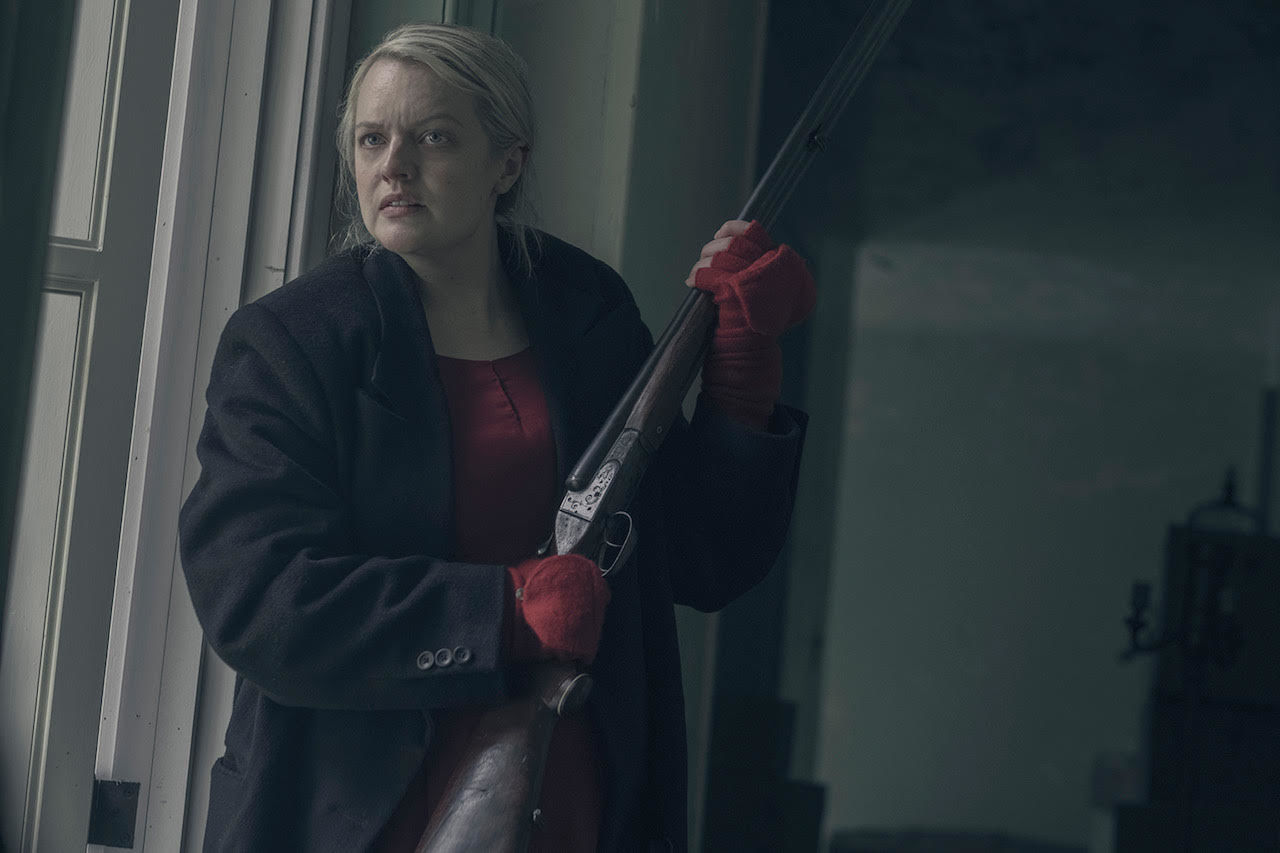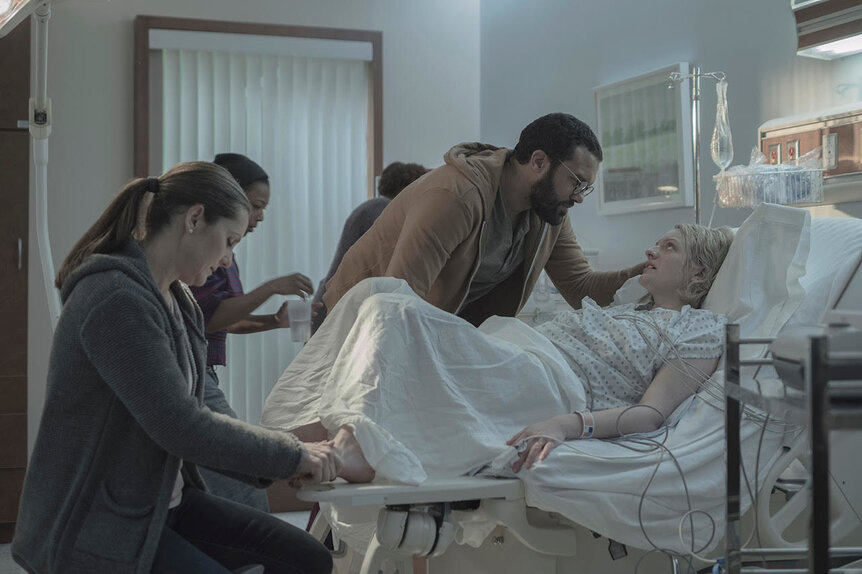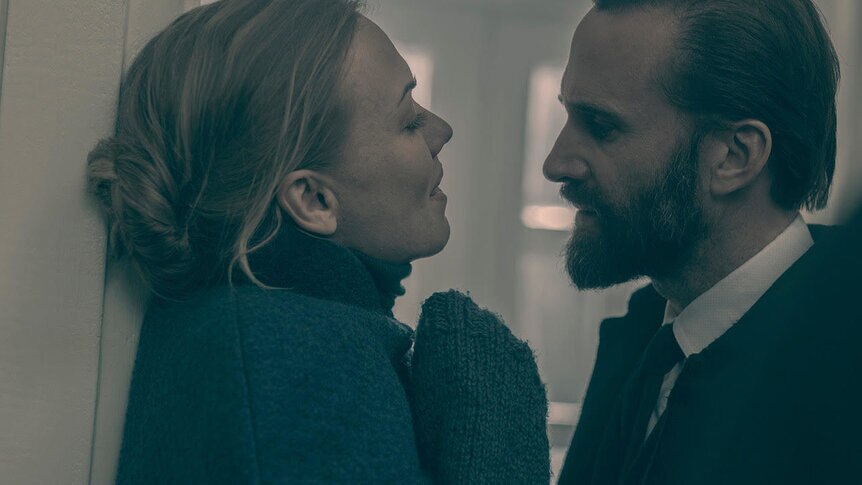Create a free profile to get unlimited access to exclusive videos, sweepstakes, and more!
Emmy Contender: How The Handmaid's Tale's birth episode found strength in Oprah and a wolf

Welcome to Emmy Contenders 2019. This month, SYFY WIRE is speaking to a long list of actors, artists, and artisans whose work earned them Emmy nominations this year. Today we speak with showrunner Bruce Miller and co-writer Kira Snyder, nominated for their work on The Handmaid's Tale Season 2 episode "Holly."
The Emmy-nominated episode of The Handmaid's Tale, "Holly" — in which June gives birth alone — is distinctive not only because it features one of the most realistic birth scenes on television, but also because of its writing style. It's lighter on dialogue than usual but structurally complex, featuring an urgent battle for survival peppered with flashbacks.
Showrunner Bruce Miller and his co-writer Kira Snyder chatted with SYFY WIRE about how they broke down the episode, the help they got from medical consultants, and how a wolf helped June find her wild side.
Congratulations on the nomination.
Miller: Thank you so much. I was shocked. There's so much great TV out there, and I assumed that we got our moment in the sun when we were nominated before. So this was just a bonus. It was all Kira.
Well, not all Kira, because apparently the idea of June giving birth on her own was something you came up with?
Miller: Um, yeah. I mean, I think it was just in counterpoint to the fact that so much of the Handmaids' birth stuff happens as a communal experience, where you kind of get that, "Wow, they do this in a nice way." I thought it would be interesting that here she is in Gilead, she never gets to be alone, she's always surrounded by people, and the one time she is alone, she has to give birth, which is something you normally do surrounded by people.
This easily could have been the season finale. How did you figure out where this story fit in the season as a whole?
Snyder: Bruce mentioned he wanted her to be on her own in some fashion, and we talked about where to place it in the season, whether or not it was the finale of Season 2. But there was more story that Bruce wanted to get to after the birth, after June has to go back to Gilead and hand over her baby. That's why it moved up.
I know some people were kind of surprised, which we like. That's one of the points of the story — you just don't know when you're going to go into labor. And she's in an incredibly stressful situation, and that can bring on labor.
Miller: I try not to lay too much structure on top of things. I try very much to let the arc of June's character and story be the guide to the rhythm of the season. It feels artificial and presumptuous to try to squeeze it so it is the most dramatic version because you and I both know that the shape of television has changed so much in the last five years. God knows what television is going to be like in 10 years! When the show is binged, the end of the season won't be that important. It'll just be Episode 13, and then you go to Episode 1 of the next season.
We get into trouble when we're compressed into places where we have to manufacture climaxes or big moments before every commercial break. They start to lose power, and the structure doesn't work so well.
Snyder: As the season took shape, and specifically the episode before it, where she has that reunion with Hannah, at the summer house, as we were talking about that episode, it seemed a great place to leave her, to strand here there, and that's where the birth could play out.
Miller: It seemed to naturally flow from her seeing her daughter Hannah. Those things went up against each other when you're doing a story about motherhood. Those two stories weren't connected to each other when we were initially talking about the season.
Snyder: An early piece that came from Bruce was June finding the car. That pulled the front half of the episode into focus because she has a concrete goal: "There's a car. I need to find the keys. I found the keys. Oh my gosh, it starts! I'm going to get out of here. I need to be smart about it. Let me get supplies. Let me get something that makes me look less like a woman driving because that's not possible in Gilead."
In the car, June listens to the radio. She hears Radio Free America, and the voice is Oprah Winfrey. Is there an extra layer to June being comforted by Oprah Winfrey?
Miller: If there's going to be a voice of Radio Free America, it has to be Oprah. There's something about her voice that sounds like what America sounds like.
But when Oprah and I discussed it, we said it's just a DJ. It isn't Oprah Winfrey. She's playing a character who is a DJ for a Radio Free America. The point was not to have Oprah playing Oprah. I'm sure you can interpret it either way, though.
What contributions did Elisabeth Moss have to the story for this episode?
Miller: Often she can kind of push me in a direction that I don't think of as challenging for an actor. She points out areas of potential interesting emotional conflict. And the biggest thing I took away from our conversation is where we overhear the Waterfords.
Snyder: We wanted someone to find her at the house. She's not just alone and relatively safe. What could spoil that is someone showing up. We talked early on about lots of different possibilities, and originally, it wasn't the Waterfords.
Miller: People show up, and what do you do? That was so it didn't feel completely isolated or disconnected from the rest of the story.
Snyder: Who are the people June would least like to see? Who was the scariest person who could show up at the house at this moment? It wouldn't just be some neighbors or a patrol of Guardians with guns, although we had that at first. We thought it would be that June tripped an alarm or something, but it wasn't super satisfying.
What was more satisfying, the scariest people who could show up would be her tormentors, specifically Serena and Fred. And it was in the script this way, to be shot like a horror movie. You have June hiding from Serena, and Serena screaming for her, stalking throughout this house. And you're like, "Don't find her! Don't find her!"
It's the first time we've heard the Waterfords have a completely raw and honest conversation.
Snyder: That was an amazing scene to get to write, because even in their own home, they don't know who's listening. This happens because they think they're alone, and all the decorum gets ripped away, and they say what they've been thinking about each other the whole time.
It's really ugly, and of course, June is witness to all of this. So when she finds the gun, it's a delicious opportunity to take out her tormenters. But as she hears Serena break down, she's not able to pull the trigger, and the moment is lost. She doesn't have the shot anymore. It's interesting because you kind of want her to do it, but you also kind of don't want her to do it. If she was able to take that shot, it would be a sign that some part of her heart or soul has been destroyed. We see more of that in Season 3.
This episode has been widely praised for providing one of the most realistic, authentic birth scenes on television.
Snyder: We're really proud of how that came out. It was a collaboration from start to finish. We spoke to OB/GYNs, midwives, moms on the staff to understand what the experience is like, and how it's different for every woman.
Miller: One of the first things we did was have casual conversations about what it would be like to give birth alone. What would you feel like? What urges would you have? Would you want to be warm? Would you want to be naked? Would you want to be under blankets? Where would she want to be?
Snyder: We also asked, "What do TV shows and movies get wrong about giving birth and being in labor?" One line Holly has in the flashback was about how she gave birth without medication because she wanted to know what it felt like, and that was a direct quote from a doctor we spoke with. She wanted to know what it felt like, and so she gave birth without anesthesia. We were just like, "Wow. That's pretty impressive."
In terms of the positions, the feedback we got was that ideally, you should do it in whatever position is comfortable. So June moves around, instead of trying to be in the classic position of lying on her back. Also understanding the time frame that would make sense for June. This is her second child, and labor is much briefer with a second child. When her water breaks, that means the baby is basically coming within the hour, and that really helped us drive the urgency for the last part of the episode.
Miller: The way we deal with nudity on the show is very much Lizzie's call. You want her to be in a position where she's not feeling self-conscious. Daina Reid, the director, and Zoë White, the cinematographer, were alone in that room with Elizabeth for two days shooting that. You just want to make sure everybody is not only comfortable with what they're doing, but comfortable talking about what they're doing while they're doing it, so they can change their mind. Deciding beforehand is one thing but after 11 hours of sweating and screaming?
So the three of them worked that scene out moment by moment. The fact that it came out so strongly is because you have those three women, and they had the time and space to do it well.
Snyder: We were able to contrast this birth experience with others in the flashbacks. June is physically alone, but she's mentally calling on her memory of her first daughter's birth, her own grown mother, her training at the Red Center, and Janine giving birth in Season 1. Even the dark stuff in Gilead helps her in this moment because that's what the Red Center training does — it trains you to give birth without anesthesia. It makes things easier, but it also makes things harder. She knows that if she goes through with this — hops in the car and hopefully makes it to Canada — she'll probably never see Hannah again.
When she thinks about Luke, is it the hope that she'll see him again? That means leaving behind Nick, the father of her child. So the memories both help and haunt her. She just has her herself and her inner strength to save herself and her daughter.
Let's talk about the wolf, which seems to lend some urgency to June's plight. And it helps her access her inner wolf, become a primal warrior.
Snyder: That's exactly it. We also wanted that as an additional sense of danger outside, so she just couldn't hike on over to a neighbor, however far that was. But it ultimately ends up being a source of comfort and strength.
Her relationship with the wolf changes over the course of the episode, and it was great to be able to play in that symbolic realm, which we don't do all that often. She starts off as a creature of civilization, scared of this thing, and then she's able to go, "Hey, I'm a wild animal in some ways, too. Gilead can't control every aspect of my life." When she goes out there with a gun, you don't quite know what she's going to do with it. Is she going to shoot herself? Is she going to shoot the wolf? But what she's doing is giving herself back over to civilization. The wolf returns to the wild as June returns to society.
















